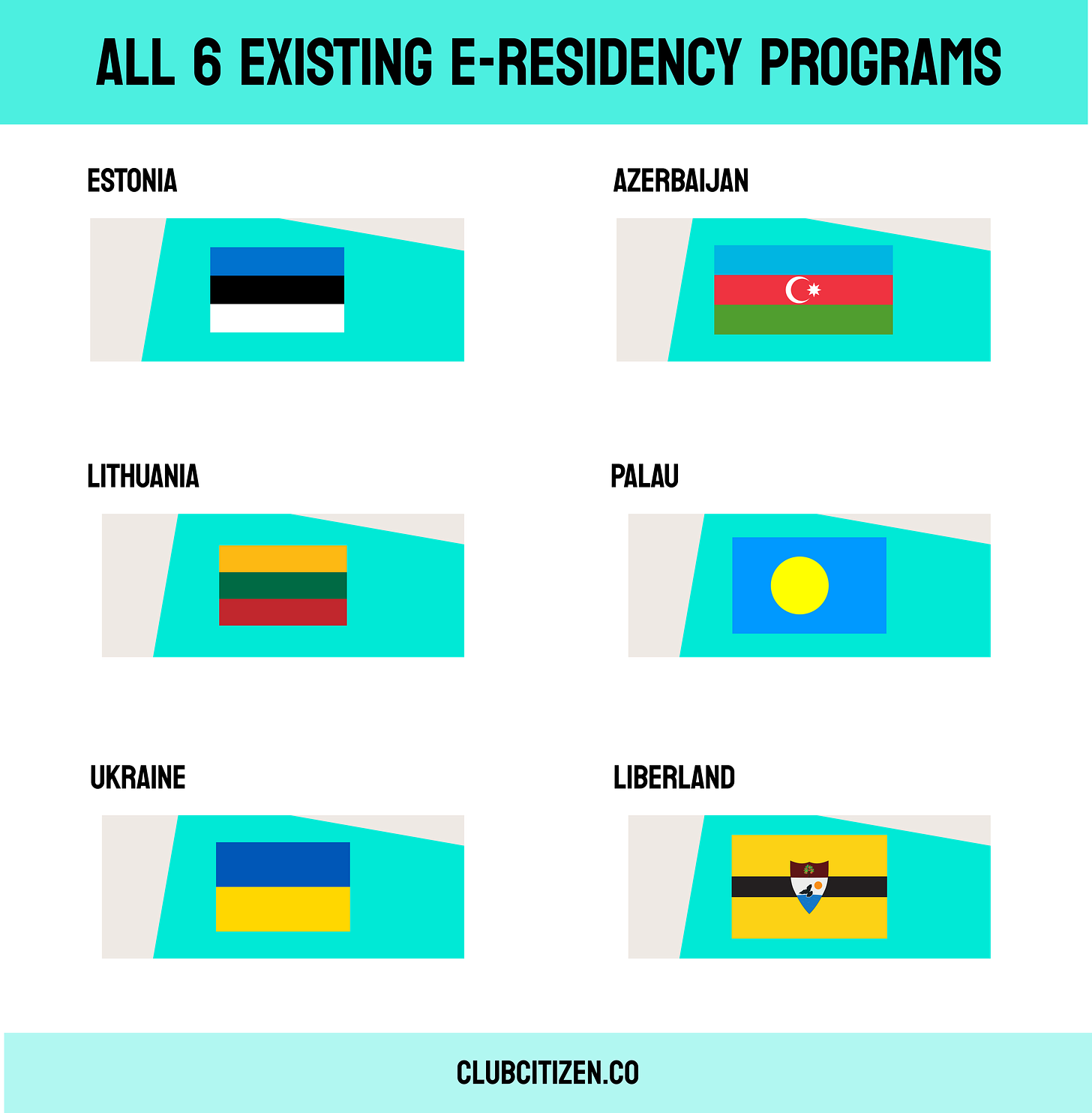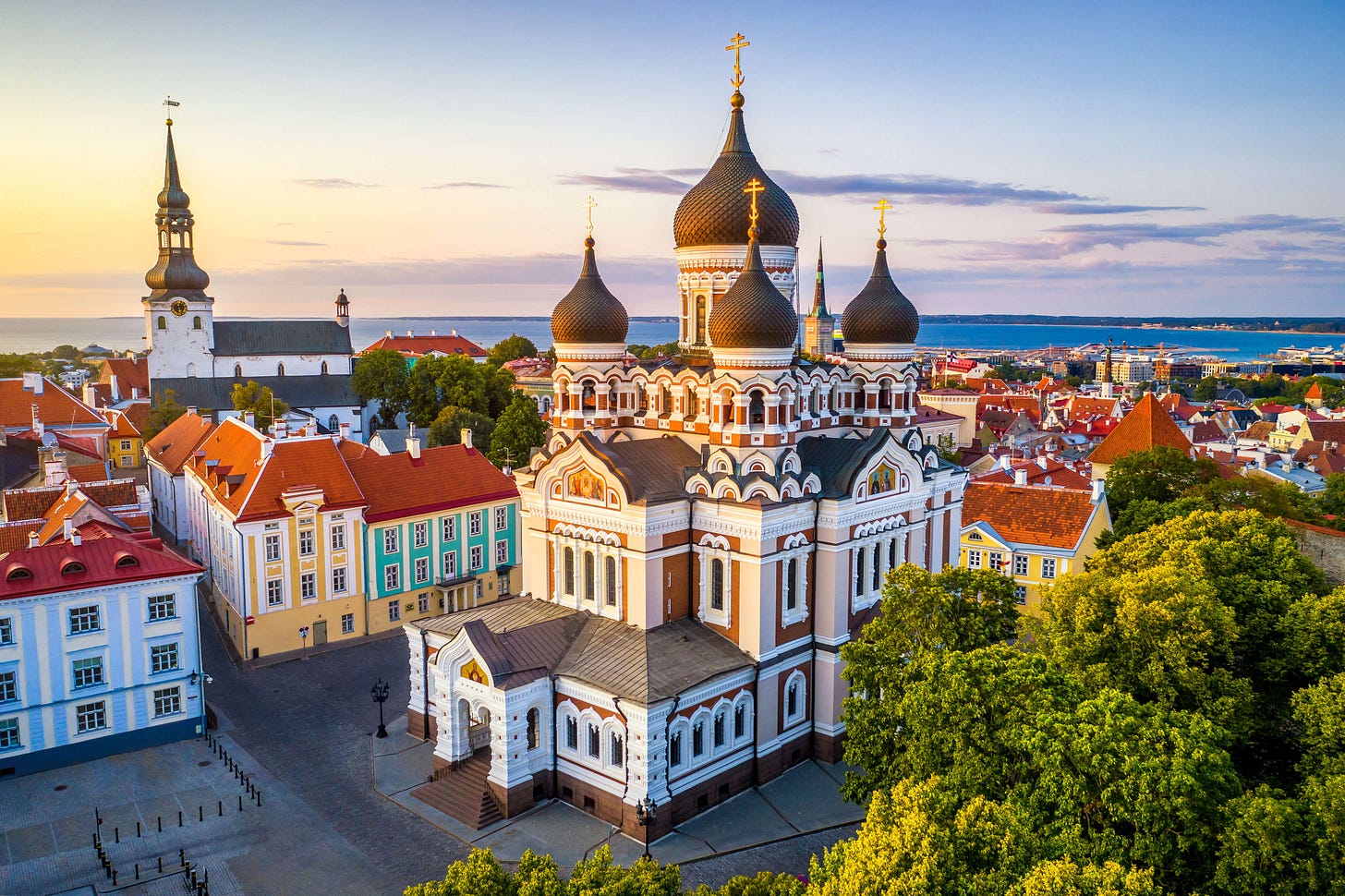All 6 Existing E-Residency Programs (Ranked by Usefulness)
E-Residency is a global concept, but only six places currently offer a functioning program.
Welcome to Digital Citizen 👋
After building businesses across multiple countries, one thing became clear. Success is not tied to one system, one location, or one way of thinking.
In today’s world, you can design life on your terms. Globally, intelligently, and with intention.
Digital Citizen is your guide to living smarter, working freely, and navigating a borderless world with clarity.
Subscribe to join a growing community of independent minds building a future without permission.
E-Residency Is Trending
E-Residency has become a buzzword in global mobility circles.
From YouTube videos to Twitter threads, it sounds like everyone is offering it. But in reality, only five countries (plus one bold micro-nation experiment) currently run live, functional e-Residency programs.
This post maps them all, and ranks them based on how valuable they are for entrepreneurs, not just how easy they are to get.
Let’s dive in …
What Is E-Residency?
E-Residency is a digital identity issued by a government that allows foreigners to access certain online services (typically business-related) without living in that country.
The concept was pioneered by Estonia in 2014 and has since been adopted, in different forms, by a handful of other nations.
At its core, e-Residency lets non-citizens incorporate and manage a business remotely. In some cases, it also enables access to local financial services, sign contracts digitally, and interact with tax systems online, all without setting foot in the country.
It’s important to understand what e-Residency is not.
It does not grant the right to live, work, or travel in the issuing country. It’s not a visa, and it doesn’t automatically make you a tax resident. It’s simply a gateway to use that country’s digital infrastructure for business or identity purposes.
For more info on what makes you a tax-resident, pls read this:
For digital entrepreneurs, nomads, or location-independent founders, e-Residency can be a powerful tool, but only if the country behind it has built a functional ecosystem around it.
How I Ranked These E-Residency Programs
Some e-Residency programs offer real, practical value for entrepreneurs. Others are still early-stage or limited in scope. Others are still experimental (more digital ID than actual business tool).
To make this list useful, I ranked the six existing programs based on four core factors:
Ease of Access
How straightforward is the application process? Can you apply fully online, or is an embassy visit required? I looked at how fast, digital, and transparent the process really is.Usefulness of Services
What does the e-Residency actually let you do? Can you set up a company, access payment providers, file taxes, and sign documents remotely, or is it more limited in scope?Operational Reliability
How stable is the system once you're inside? Are the tools and platforms maintained, are local service providers available, and can you realistically run a business day to day?Cost
What does it cost to apply, renew, and maintain the status, including indirect costs like hiring local agents, using required service providers, or traveling to collect your ID?
These four points together give a realistic picture of which programs are not only available, but actually usable.
1. Estonia
Launch year: 2014
Best for: Founders who want to run an EU-based company 100% remotely.
Estonia launched the world’s first e-Residency program and remains the most complete offering available today. It provides a seamless application process, strong legal infrastructure, and access to a full suite of digital services, from company formation to tax filing.
Ease of Access
The application is fully online and typically takes a few weeks. Once approved, you pick up your digital ID card at an Estonian embassy or consulate. The process is smooth, standardised, and well-documented. I picked up my e-Residency at the Estonian Embassy in Berlin in 2018, and I was in and out in less than an hour.
Usefulness of Services
Estonia offers one of the most comprehensive service stacks. You can start and manage a limited company, access EU tax and legal frameworks, sign contracts digitally, and work with a wide range of local service providers. Opening a business bank account is possible but has become more challenging due to tightening regulations. My advice is, to use a Fintech (such as Wise).
Operational Reliability
Estonia has a mature and well-supported ecosystem. Government services are stable, the digital infrastructure is maintained, and there’s a thriving market of accountants, legal advisors, and tech platforms built around e-Residents.
Cost
Application fee: approximately €100
Embassy pickup: may require travel depending on your location
Monthly operating costs: typically €50 to €100+ for address services, accounting, and compliance (my recommendation: use “Xolo” as a service provider)
Additional services (e.g. banking, virtual offices) vary by provider
Where to apply: e-resident.gov.ee
2. Lithuania
Launch year: 2021
Best for: Entrepreneurs who want an EU option with growing support infrastructure.
Lithuania launched its e-Residency program in 2021 as a direct response to Estonia’s success (if you can call 7 years later a “direct response”). While the ecosystem is still maturing, it offers access to core digital services like company registration, tax reporting, and digital signatures, all under EU law.
Ease of Access
The application starts online but requires an in-person visit to a Lithuanian embassy or migration office to collect your digital ID. Processing times are typically fast, but global coverage for ID pickup is more limited than Estonia’s.
Usefulness of Services
You can register a company, submit tax declarations, and use digital authentication tools. However, fewer service providers are available compared to Estonia, and access to EU business banking is more limited. Still, it’s a viable setup for remote EU business operations.
Operational Reliability
The system is functional and backed by a digital-forward government. But the ecosystem is still growing, meaning fewer English-language resources, accountants, and international support services are available at this stage.
Cost
Application fee: approximately €90
ID pickup: requires an in-person visit
Monthly operating costs: vary based on services, but expect €50 to €100+ for address, compliance, and accounting
Fewer bundled provider packages compared to Estonia, so expect more DIY coordination
Where to apply: migracija.lt
3. Ukraine
Launch year: 2021
Best for: Freelancers and solo digital service providers who want ultra-simplified taxation and minimal admin.
Ukraine’s e-Residency program was designed with solo operators in mind and not startups or teams. It allows foreign nationals to register as a private entrepreneur under the FOP (ФОП) model, offering a simple flat tax and almost no overhead. It’s a lean, low-cost alternative for freelancers who don’t need a full company structure.
Ease of Access
The entire process is online and available through Ukraine’s Diia platform. No embassy visits or ID pickups are required, making it one of the smoothest application flows in the e-Residency world. The main limitation is the lack of language localization and occasional friction navigating the system in English.
Usefulness of Services
Unlike Estonia and Lithuania, Ukraine’s e-Residency doesn’t let you form a limited company. Instead, you register as a sole proprietor (FOP), which is legally recognized for invoicing, tax filing, and running a business, but without the legal separation of a corporation. This makes it ideal for individuals offering digital services, but less suitable for those building brands, raising funds, or working with EU partners who require company structures.
That said, the tax simplicity is hard to beat:
5% flat tax on revenue
No VAT or complex filings
Minimal ongoing paperwork
You can also issue invoices, hire a local accountant, and operate fully online.
Operational Reliability
Despite the war, Ukraine has maintained its digital government services impressively well. The Diia platform is one of the most advanced in the region. However, support in English is limited, and it can take time to find reliable accountants or service providers if you don’t speak Ukrainian. Also, banking remains a challenge, since you’ll need a Ukraine-based bank account, and integration with Stripe, PayPal, or Wise is not guaranteed.
Cost
Application fee: approximately $20
Monthly taxes: 5% of revenue (under the simplified tax system for FOPs)
Accountant: optional, usually under $20/month
Bank account: required locally, but online-first options exist
Compared to Estonia or Lithuania, Ukraine offers less structure and legal protection, but far lower cost and less admin. If you're a solo freelancer who doesn’t need an EU company or complex operations, it’s a smart minimalist setup.
Where to apply: e-resident.diia.gov.ua
4. Azerbaijan
Launch year: 2018
Best for: Entrepreneurs looking for a functional but under-the-radar digital identity and business setup option in the Caucasus region.
Azerbaijan offers both e-Residency and m-Residency (mobile-based) programs aimed at enabling foreigners to remotely access business registration, e-signatures, and government services. While the program is functional, it lacks the international visibility and ecosystem maturity of Estonia, Lithuania, or even Ukraine.
Ease of Access
Application is available online via the Digital Trade Hub (DTH) platform. While the signup process is not as polished as Estonia’s, it’s relatively straightforward. Applicants receive a digital ID enabling access to local e-services. Embassy visits are not always required, but verification steps may vary depending on your location.
Usefulness of Services
Azerbaijan allows e-residents to register businesses, obtain digital signatures, and interact with government platforms remotely. However, the use cases are limited by a smaller network of international-facing service providers. While the legal structure allows for business operations, it's harder to open global bank accounts or payment gateways compared to EU-based programs.
There is no integrated freelance tax scheme like Ukraine’s, and you’ll need more manual setup to stay compliant. Still, somehow the system works, and some global founders have successfully set up LLCs with local support.
Operational Reliability
The government has invested in digitalization, and the DTH portal is functional, but the ecosystem around it is not that developed. English support is limited, and there’s a lack of easy service bundles (e.g. accounting, virtual office, tax agents). You’ll likely need local contacts or custom assistance to set up smoothly.
Cost
Application fee: varies (often bundled with service providers)
Digital certificate: ~$60/year
Business maintenance costs: depends on local service contracts
Bank access: limited for foreign-owned entities; fintech options are scarce
Azerbaijan works, but mostly for founders with very specific regional interests or those comfortable navigating less polished systems. If it’s your first e-Residency, you are better off with options 1-3.
Where to apply: dth.az
5. Palau
Launch year: 2022
Best for: Web3 builders, digital nomads, and DAO participants needing a verified digital identity
Palau’s Digital Residency Program is a different type of e-Residency. It doesn’t focus on business creation or tax access. Instead, it provides a government-backed digital ID that can be used for identity verification in online platforms, especially within blockchain and decentralized ecosystems.
Ease of Access
The application is fully online and fast. You can apply from anywhere with a passport and a selfie. The process is straightforward and processed within days. No embassy visit, no card pickup, just a digital identity issued remotely. I applied for mine is less than 30 minutes.
Usefulness of Services
There’s no company formation, no banking, and no tax services. Instead, it’s designed to serve as a government-issued digital ID for KYC use, online reputation systems, and blockchain-based services. It's been adopted in Web3 communities where identity verification is needed without compromising anonymity or decentralization goals.
If you're looking to invoice clients, open a business bank account, or register a company, this is not the tool for you.
Operational Reliability
The system is functional and backed by the Palauan government. The issuing process works, and the platform has integrated with several Web3 services. But outside that niche, there’s very limited infrastructure. No legal support, business ecosystem, or international service networks.
Cost
Application fee: ~$250 (for 1-year digital residency)
Renewals: annual fees apply (only if you renew, you can keep the ID as a token, like I did)
No additional operational costs (no company or compliance obligations)
No bundled services or extra setup required
Palau is a digital identity tool. It serves a narrow but growing use case for digital verification, especially in crypto and decentralized environments.
Where to apply: rns.id
6. Liberland
Launch year: 2015
Best for: Libertarian-leaning internet citizens, crypto idealists, and anyone who likes micronations with strong branding.
Liberland claims to be a sovereign nation located between Croatia and Serbia, and it offers e-Residency. Sort of.
While the government is self-declared and not internationally recognised, you can apply for a digital ID, register a company on their blockchain, and receive a certificate stating you’re an e-resident of Liberland. Whether that means anything in the real world is… let’s say open to interpretation.
Ease of Access
The signup process is online and fast. You fill out a form, upload documents, and pay a small fee. No embassies, no background checks, no bureaucracy. It’s arguably the easiest e-Residency in the world, though not the most useful.
Usefulness of Services
Liberland offers a digital identity and the ability to register companies on the Liberland blockchain. However, these companies are not recognized by any other jurisdiction. There is no connection to banking systems, tax offices, or legal frameworks outside the Liberland platform. It's closer to a philosophical experiment than a business tool.
That said, you can impress your crypto friends with a Liberland ID card and say you’re a citizen of a stateless blockchain nation. Which, depending on your circle, might be worth more than a Stripe account.
Operational Reliability
The website works. The ID cards are delivered. And Liberland continues to build its digital ecosystem in the Web3 space. But from a business operations standpoint, there’s no real infrastructure, and no expectation of integration with the global economy.
Cost
Application fee: ~$30 to $100 depending on the tier
Digital documents and card printing: additional fees may apply
No actual running costs (because there’s nothing to run)
Liberland’s e-Residency is symbolic. If you want credibility, structure, or a functioning company, look elsewhere. But if you want to be part of a digital utopia with its own constitution and flag: welcome aboard.
Where to apply: liberland.org
Comparision
To make things easier to digest, here’s a side-by-side overview of the six existing e-Residency programs, comparing them across access, services, reliability, cost, and ideal use cases.
If you want the most reliable and complete setup for running a remote EU company, choose Estonia.
If you want a credible EU option with growing support and don’t mind a bit more manual setup, choose Lithuania.
If you’re a solo freelancer looking for ultra-simple taxes and almost zero overhead, choose Ukraine.
If you’re interested in a functional but regional setup and can handle some complexity, choose Azerbaijan.
If you need a government-backed digital ID for Web3 or identity verification, choose Palau.
If you’re into crypto experiments, digital sovereignty, or just want to support a libertarian micronation, choose Liberland.
To Sum It Up
Only a handful of countries have turned the concept of e-Residency into something functional. And even fewer have made it truly useful for entrepreneurs.
Estonia still leads the space with a full-service ecosystem that’s tested, stable, and globally recognised. Lithuania is a promising second option for those who want an EU presence. Ukraine offers a lean, no-fuss alternative for solo freelancers. The others serve more niche needs, and should be approached with clear expectations.
As the concept evolves, we’ll likely see more countries experimenting with digital residency programs (there are quite a few in the works, some of them very promising).
But for now, these six are the only ones that exist.
If you liked this, you might also like …
Thanks for reading and see you soon! ❤️
If you’re enjoying Digital Citizen, tap ❤️ and 🔄 at the top to help more curious minds find their way here. It means a lot.












Thanks for putting this together Benjamin. I didn't know other countries has e-residency in place apart from Estonia.
I still struggle to wrap my head around the usefulness of those to be honest. Maybe it's because I'm European and I "don't need it" as much.
Would you say it's practical for American who wants to do business in Europe?
But is it better than a LLC there then 🤔